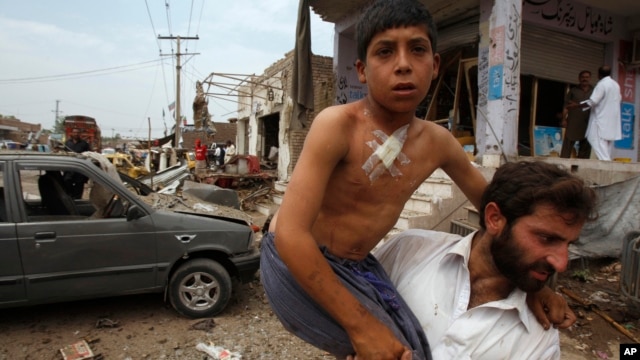
Pakistani man helps injured boy at site of car bombing on outskirts of Peshawar, Pakistan, June 30, 2013.
ISLAMABAD — Authorities in Pakistan say the death toll from Sunday’s several bombings across the country has risen to more than 50. There were more deaths Monday when gunmen shot two policemen in Peshawar in the country's northwest.
There is growing shock and outrage in Pakistan over the violence, as nearly 300 people have died during the month of June alone.
The deadliest attack Sunday occurred in the southwestern city of Quetta where a suicide bomber struck evening prayers at a mosque for Shiite Muslims. There were nine women and several children among at least 30 killed in that blast, while dozens more were wounded.
Several massive bombings have targeted the minority Hazara community in Quetta since the beginning of the year. An outlawed Pakistani Sunni militant group, Lashkar-e-Jhangvi, has claimed responsibility for the massacres.
Other attacks took place in the northwestern city of Peshawar and in North Waziristan, which is one of the adjoining volatile tribal districts. Those bombs targeted Pakistani security forces, but civilians were among the victims. Local militants linked to the extremist Tehreek-e-Taliban Pakistan are mostly behind the violence in that part of the country.
Militant, sectarian and ethnic-related violence has claimed thousands of lives in Pakistan in recent years. Critics like former law minister Ahmer Bilal Soofi said that lack of effective policy and reforms in the legal framework are to be blamed.
“There is a heavy reliance in Pakistan on witnesses. Witness has to see the occurrence. He has to be available on the crime scene and then he has to be saying the same thing in the court, which hardly happens," Soofi explained. " I mean normally witnesses run away if they are finally available there is a serious issue of witness protection. No one wants to come and depose against non-state actor or for that matter a terrorist of any descent standing. And as a consequence, there is nothing on the trial and there is no material for the judge to rely upon.”
Pakistani newspaper editorials and human rights groups on Monday criticized the national security and intelligence agencies for their “incapacity to arrest and tackle the terror networks”. A Human Rights Commission of Pakistan statement demanded appropriate counter-measures in light of “the fact that weapons large and small, including explosives and bomb-making skills, are so easily available all over the country".
Pakistan’s newly-elected Prime Minister Nawaz Sharif has promised to devise a new security policy to deal with the threat of terrorism, a major reason for the troubled national economy and declining foreign investment in the country.
The latest violence occurred on a day when Sharif was holding talks with visiting British Prime Minister David Cameron. Speaking together with the British counterpart, the Pakistani prime minister told reporters his government is determined to root out terrorism and extremism.
“We are convinced that terrorism is a common threat and a huge global challenge," Sharif said. "Pakistan has suffered the most in terms of human and financial losses. We are, therefore, resolved to tackle the menace of extremism and terrorism with renewed vigor and close cooperation with our friends.”
In an unprecedented attack in late June, suspected militants killed 10 foreign mountain climbers in northern Pakistan at a base camp of Nanga Parbat, the ninth highest mountain in the world. Chinese and Ukrainians were among the victims.
Some officials blame their country’s cooperation in the U.S.-led anti-terrorism war in neighboring Afghanistan for the rise in extremist violence. But critics cite links between Pakistani intelligence agencies and Islamist groups fighting alongside Afghan insurgents, and militants fighting in India in the disputed Kashmir region.
|
|
